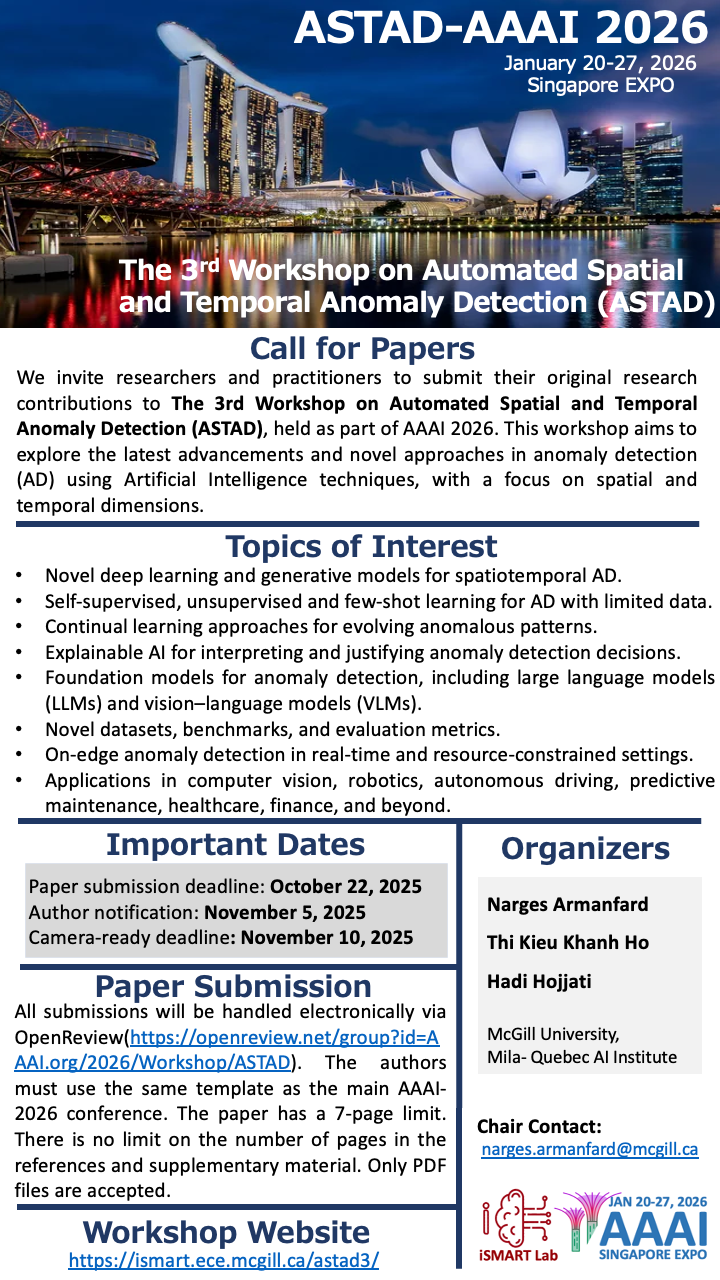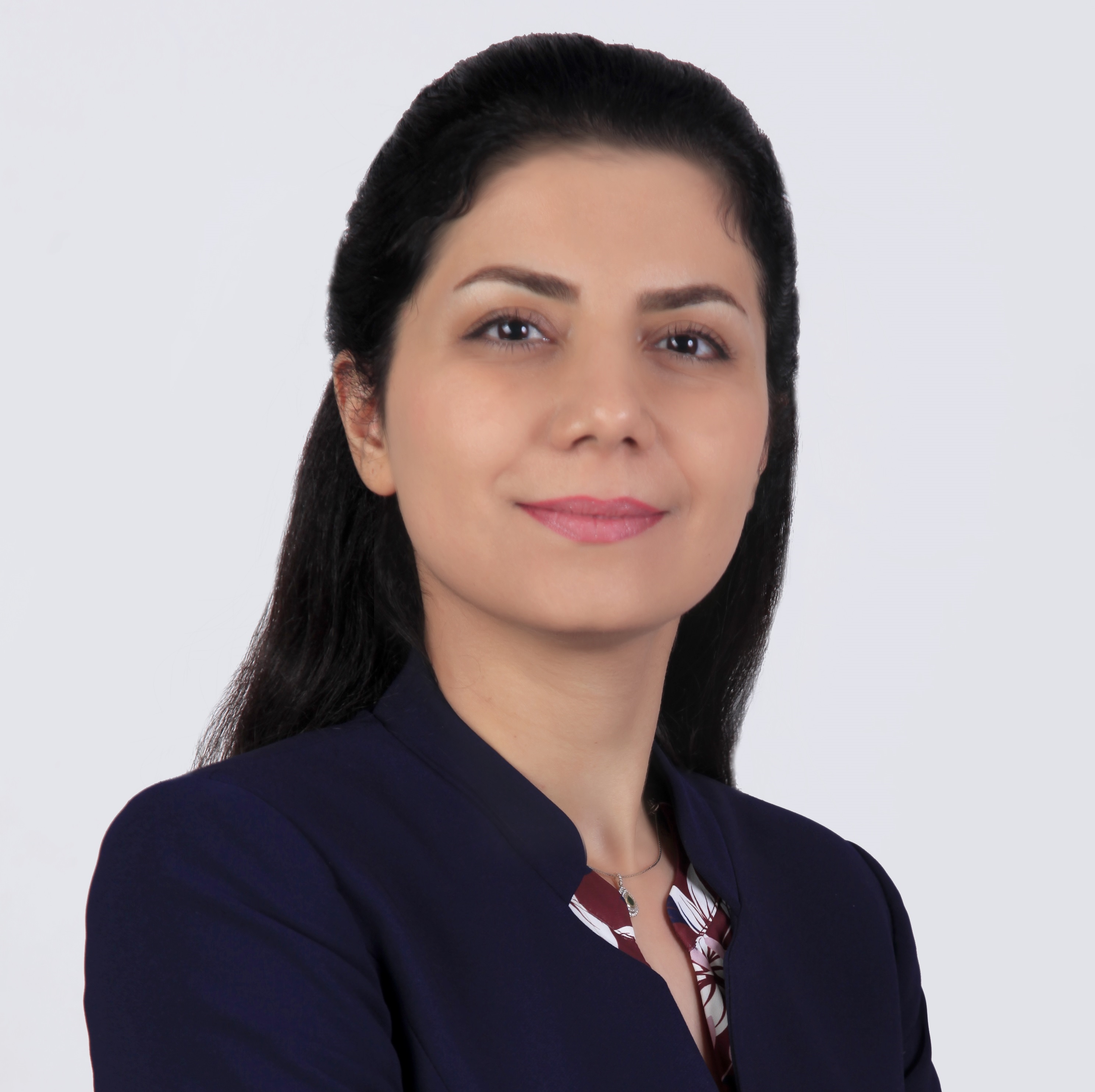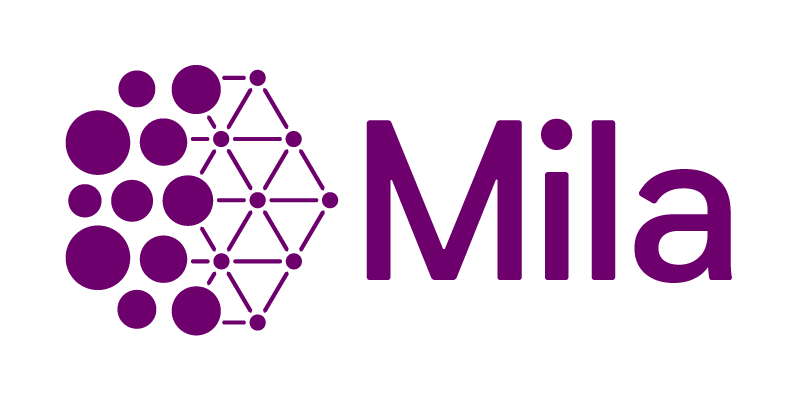3rd Workshop on Automated Spatial and Temporal Anomaly Detection (ASTAD)

Overview
The 3rd Workshop on Automated Spatial and Temporal Anomaly Detection (ASTAD) at AAAI 2026 is a premier platform for researchers and practitioners at the forefront of AI-driven anomaly detection. With the proliferation of spatiotemporal data from sources like surveillance cameras, IoT sensors, and satellite imagery, the need for robust, automated systems to identify novel and unusual patterns has never been more critical. This workshop will delve into cutting-edge AI techniques that move beyond traditional rule-based methods to uncover hidden anomalies, fostering a new generation of intelligent monitoring and discovery. Join us to discuss how we can build more resilient, autonomous, and insightful systems for a safer and more efficient world.
Call for Paper
We invite researchers and practitioners to submit their original research contributions to The 3rd Workshop on Automated Spatial and Temporal Anomaly Detection (ASTAD), held as part of AAAI 2026. This workshop aims to explore the latest advancements and novel approaches in anomaly detection (AD) using Artificial Intelligence techniques, with a focus on spatial and temporal dimensions. Topics of Interest :
- Novel deep learning and generative models for spatiotemporal AD
- Self-supervised, unsupervised and few-shot learning for AD with limited data
- Continual learning approaches for evolving anomalous patterns
- Explainable AI for interpreting and justifying anomaly detection decisions
- Foundation models for anomaly detection, including large language models (LLMs) and vision-language models (VLMs)
- Novel datasets, benchmarks, and evaluation metrics
- On-edge anomaly detection in real-time and resource-constrained settings
- Applications in computer vision, robotics, autonomous driving, predictive maintenance, healthcare, finance, and beyond
Submission Site: OpenReview
Schedule
- 09:00 – 09:15: Opening
- 09:15 – 10:15: Keynote: Dr. Ye Zhu
Anomaly Detection Based on Isolation Mechanisms - 10:15 – 10:30: Coffee Break
- 10:30 – 12:00: Paper Session (Oral)
- 12:00 – 13:00: Lunch Break
- 13:00 – 14:00: Keynote: Dr. Jie Ren
Uncertainty Estimations in LLMs - 14:00 – 15:00: Keynote: Prof. Pang Guansong
Anomalies Are Not a Class: Leveraging Labeled Anomalies in Deep and Generalist Anomaly Detection - 15:00 – 15:30: Poster Session
- 15:30 – 16:00: Coffee Break
- 16:00 – 16:50: Poster Session
- 16:50 – 17:00: Closing
Important Dates
The important dates are as follows:
- Paper submission deadline: October 22, 2025
- Author notification: November 5, 2025
- Camera-ready deadline: November 10, 2025
- Workshop Date: January 26, 2026 (9AM - 5PM Singapore Time)
- Workshop Location: Grand Mercure Roxy Hotel – Amber
Accepted Papers
| Paper ID | Title | Authors | |
|---|---|---|---|
| 1 | Unveiling the Flaws: A Critical Analysis of Initialization Effect on Time Series Anomaly Detection | Alexander Koran, Hadi Hojjati, Narges Armanfard | |
| 2 | EngineAD: A Real-World Vehicle Engine Anomaly Detection Dataset | Hadi Hojjati, Christopher Z Roth, Rory Woods, Ken Sills, Narges Armanfard | |
| 3 | Generative Flow Models in Weight Space for Detecting Covariate Shifts | Daniel Saragih, Deyu Cao, Tejas Balaji | |
| 4 | Advancing Thermal Fault Diagnostics for Lithium-Ion Energy Storage Systems: An Autonomous Vision Foundation-Based Approach | Huixin Xu, Chaoyu Dong, Qian Xiao, Yu Jin, Hongjie Jia | |
| 5 | Leveraging Physics Anomaly Knowledge and Contrastive Learning for Region-Agnostic Landslide Prediction | Ren Ozeki, Hirozumi Yamaguchi | |
| 6 | Domain-Adaptive Video Captioning for Surveillance Videos | Fengqi Zhang, Chunrui Hua, Shuaijie Li, Wen Qi | |
| 7 | Anomaly-driven Reinforcement Learning | Saurabh Varshneya, Maik Schürmann, Philipp Liznerski, Mayank Chetan Ahuja, Jan C. Aurich, Sophie Fellenz, Marius Kloft | |
| 8 | Benchmarking IoT Time-Series AD with Event-Level Augmentations | Dmitry Zhevnenko, Aleksandr Kovalenko, Fedor Meshchaninov, Anton Kozhukhov, Travnikov Vladislav, Makar Ippolitov, Kirill Yashunin, Iurii Katser, Ilya Makarov | |
| 9 | Bridging the Data Gap: Spatially Conditioned Diffusion Model for Anomaly Generation in Photovoltaic Electroluminescence Images | Shiva Hanifi, Sasan Jafarnejad, Raphael Frank | |
| 10 | Modular Segmentation-Agnostic Framework for Object-Based Change Detection in Multi-Temporal VHR Imagery | Abdul-Rashid Zakaria, Teresa J. DiMeola, Charles Walter, Pasi Lautala, Thomas Oommen, Hong Xiao |
Speakers

Dr. Ye Zhu
School of Information Technology, Deakin University
Dr Ye Zhu is a Senior Lecturer of computer science with the School of Information Technology, Deakin University, Geelong, VIC, Australia. He is an IEEE senior member and also a visiting faculty in Peking University and Nanjing University. He received a PhD degree in Artificial Intelligence with a Mollie Holman Medal for the best doctoral thesis of the year from Monash University in 2017. His research focuses on the fields of data mining and machine learning, particular topics including clustering analysis, anomaly detection, similarity learning, and their applications for pattern recognition and information retrieval. Dr Zhu has published over 90 papers in top-tier conferences and journals, including SIGKDD, VLDB, ICML, IJCAI, AAAI, AIJ, VLDBJ, ISJ, TKDE, PRJ, JAIR, and MLJ.

Prof. Pang Guansong
School of Computing and Information Systems, Singapore Management University
Dr. Guansong Pang is a tenure-track Assistant Professor of Computer Science and Lee Kong Chian Fellow at the School of Computing and Information Systems, Singapore Management University (SMU), where he leads the Machine Learning & Applications (MaLA) Lab. He is also a faculty member of Centre on Security, Mobile Applications and Cryptography. He was a Research Fellow with the Australian Institute for Machine Learning (AIML), University of Adelaide, Australia. Before joining AIML, he received his Ph.D. at University of Technology Sydney (UTS), Australia. His research interests include machine learning, data mining, and computer vision, with a research theme focused on recognizing and generalizing to abnormal, unknown, or unseen data for creating trustworthy AI systems. Read more

Dr. Jie Ren
Google DeepMind
Jie Ren is a Staff Research Scientist at Google DeepMind. She holds a PhD in Computational Biology and Bioinformatics and an MSc in Statistics, from the University of Southern California. Jie’s research centers on developing trustworthy AI solutions that can be safely deployed in real-world scenarios, aiming to advance scientific discoveries and enhance human well-being. Her work spans three key areas: (1) uncertainty estimation and robustness in large foundation models, (2) out-of-distribution detection and robustness in deep learning, and (3) the development of reliable machine learning for real-world application, with a special focus on biological and medical research.
Workshop Poster

Organizers

Narges Armanfard (Chair)
Associate Professor - narges.armanfard@mcgill.ca
Narges Armanfard is an Associate Professor of Electrical and Computer Engineering at McGill University and Mila - Quebec AI Institute. She is also affiliated with McGill Centre for Intelligent Machines (CIM), McGill initiative in Computational Medicine (MiCM) and McGill Institute for Aerospace Engineering (MIAE). Dr. Armanfard is the founder and principal investigator of the iSMART Lab with the mission to pioneer advanced algorithms in artificial intelligence, with expertise in computer vision, time series analysis, tabular data, large language models, and visual language models.

Thi Kieu Khanh Ho
AI Researcher (Postdoctoral) - thi.k.ho@mail.mcgill.ca
Khanh received her PhD degree in AI at McGill University and her Master’s degree at Gwangju Institute of Science and Technology (GIST), South Korea. She was a researcher at Seoul National University Hospital (SNUH), South Korea, before moving to Montreal for her PhD. She has received the prestigious McGill Engineering Doctoral Award (MEDA), the GREAT Award, and the highly prestigious Vanier Scholarship and Chwang Seto Award. Her research focuses on time-series data analysis using generative models and graphs.

Hadi Hojjati
AI Researcher (PhD) - hadi.hojjati@mcgill.ca
Hadi received his Bachelor’s degree in Electrical Engineering from Sharif University of Technology, Iran. He started as an MSc student at the iSMART Lab. and fast-tracked to PhD. He has received the Graduate Excellence Fellowship Award (GEF), McGill Engineering Doctoral Award (MEDA), GREAT Award, and AGE-WELL Award. He is currently doing research on multi-modal data analysis and anomaly detection employing lightweight multimodal large language models.
Keynote Talks
Dr. Ye Zhu
Title: Anomaly Detection Based on Isolation Mechanisms
Abstract: Anomaly detection is a longstanding and active research area that has many applications in domains such as finance, security and manufacturing. However, the efficiency and performance of anomaly detection algorithms are challenged by the large-scale, high-dimensional and heterogeneous data that are prevalent in the era of big data. Isolation-based unsupervised anomaly detection is a novel and effective approach for identifying anomalies in data. It relies on the idea that anomalies are few and different from normal instances, and thus can be easily isolated by random partitioning. Isolation-based methods have several advantages over existing methods, such as low computational complexity, low memory usage, high scalability, robustness to noise and irrelevant features, and no need for prior knowledge or heavy parameter tuning. This talk reviews the state-of-the-art isolation-based anomaly detection methods, including their data partitioning strategies, anomaly score functions, and algorithmic details. It also discusses some extensions and applications of isolation-based methods in different scenarios, such as detecting anomalies in streaming data, time series, trajectory and image datasets.
Dr. Jie Ren
Title: Uncertainty Estimations in LLMs
Prof. Pang Guansong
Title: Anomalies Are Not a Class: Leveraging Labeled Anomalies in Deep and Generalist Anomaly Detection
Abstract: Most anomaly detection (AD) research focuses on unsupervised or semi-supervised settings, where models are trained using only normal data, or unlabeled data assumed to be predominantly normal. While this paradigm avoids reliance on anomaly labels, it inherently limits discriminability, as models lack explicit knowledge of what constitutes abnormality. In many real-world applications, however, labeled anomaly examples are available. These may include verified defect or tumor samples in a target system, as well as curated anomaly datasets released publicly. Such labeled anomalies encode valuable prior knowledge about abnormalities of interest and, when properly leveraged, can significantly enhance detection performance. A key challenge is that labeled anomalies rarely exhaust the space of abnormal behaviors encountered at inference time, raising fundamental questions about generalization beyond seen anomaly types. This talk reviews recent progress in “supervised anomaly detection”, a paradigm that exploits labeled anomaly data while explicitly addressing unknowingness, open-set nature of anomalies. We discuss two research directions. The first focuses on open-set supervised anomaly detection, where models are trained with known anomaly classes yet are required to detect previously unseen anomalies during inference. The second explores generalist anomaly detectors, which are trained once on auxiliary labeled anomaly datasets and can generalize across domains/datasets without retraining. Together, these advances challenge the notion of anomalies as a fixed class (i.e., supervised anomaly detection ≠ binary classification) and point toward more discriminative, generalized anomaly detection systems.


